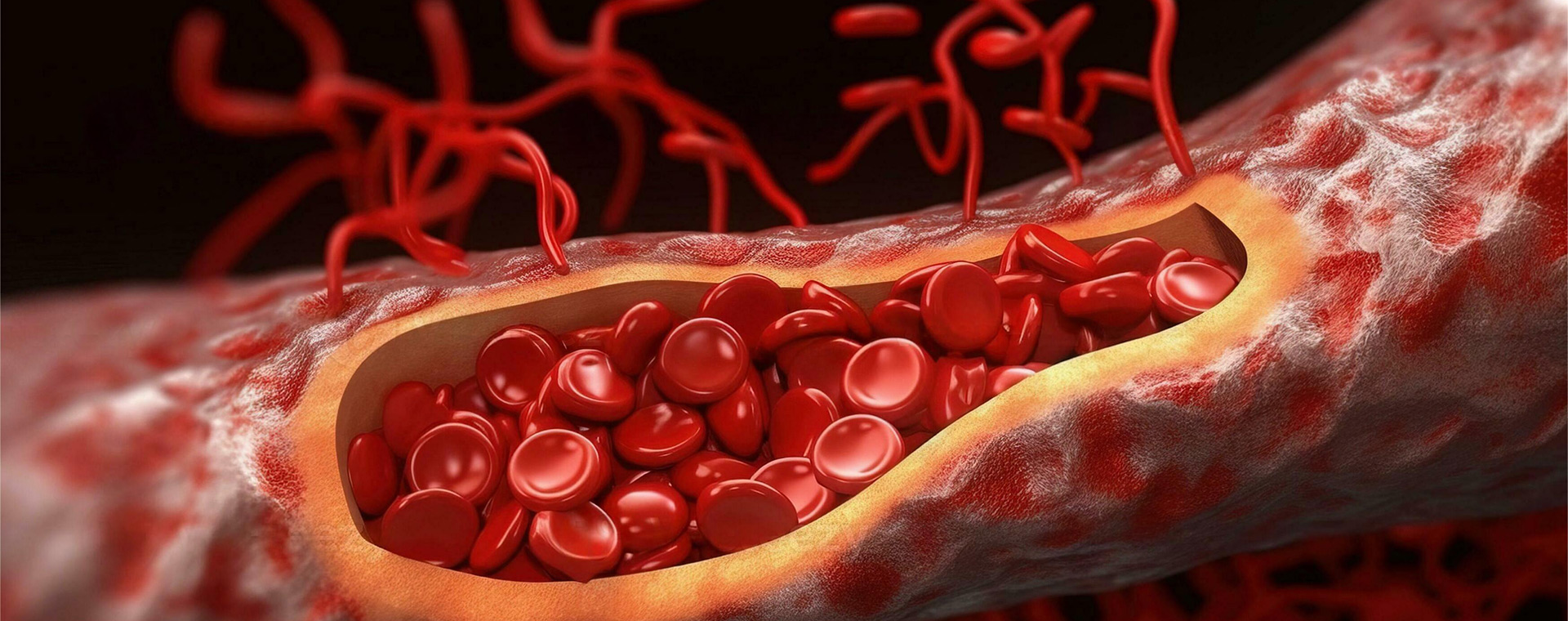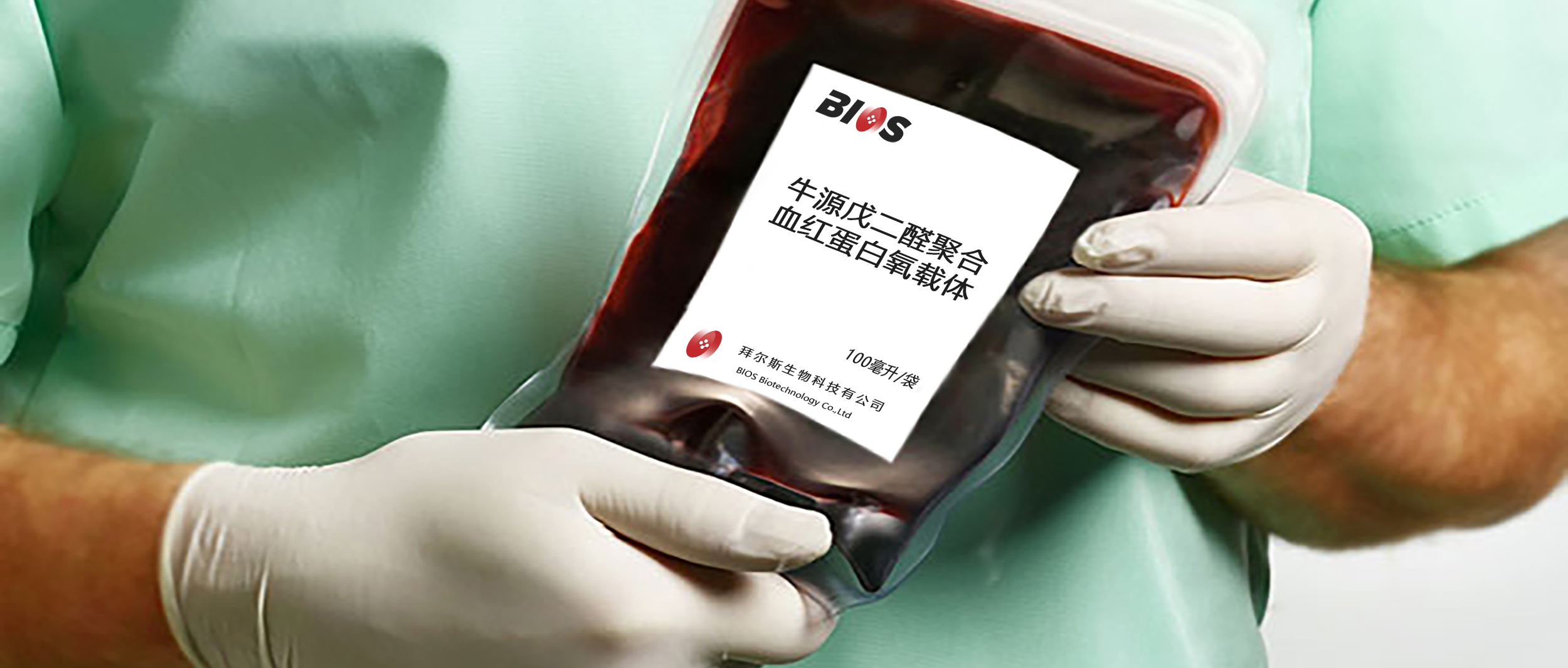
-
Products
Aerobic respiration has an absolute need for Oxygen, the vast majority of which is transported around the body bound to hemoglobin, a protein found in red blood cells. Oxygen deprivation increases the risk of hypoxemia (low oxygen levels in the blood), and subsequently hypoxia (low oxygen levels in the tissues). Within minutes of oxygen deprivation there can be damage to the brain, liver, and other organs.
BIOS medicinal development focus is to treat oxygen deprivation resulting from anemia and ischemia. Anemia is a reduction in the number of healthy circulating red blood cells, and therefore a reduction in the amount of available hemoglobin to transport oxygen to tissues and organs. There are many possible causes for anemia, but they all fall within at least one of three categories: blood loss (such as from an injury or medical procedure), reduced production of healthy red blood cells (examples include sickle cell anemia and iron deficiency anemia), and destruction of red blood cells (such as in hemolytic anemia). Ischemia is produced by localized, inadequate red blood cell flow, caused by obstructed or constricted blood vessels. This condition can lead to stroke, heart attack or other organ or tissue dysfunction.
When Oxapex®, YQ23®, HB-201, and AP-301 is infused into the bloodstream, the chemically stabilized hemoglobin molecules both carry oxygen in the plasma, and facilitate the release of oxygen from red blood cells, thereby increasing diffusion of oxygen to tissues. The purpose of intravenous oxygen-delivery support is to help stabilize the patient and prevent tissue damage or organ dysfunction associated with oxygen deprivation.
In addition, since the hemoglobin polymers in our products are relatively small, these molecules can disperse throughout the entire plasma space, including the area between and around red blood cells, and are in continuous contact with the blood vessel wall where oxygen transport to tissues takes place. The presence of one of these solutions in the plasma could allow for the delivery of oxygen to areas poorly perfused by red blood cells when partial occlusion related to disease or injury is present.
Also in our development pipeline is a medical device application, where OP-101 is used as an additive to perfusates used in ex-vivo organ perfusion. The product’s primary function is to pick up oxygen (through a typical membrane oxygenation medical device) and deliver it to the organ’s tissues. In this ex-vivo scenario the product does not interact with tissues in any way that a pharmacologic agent would. Instead, it releases oxygen in microenvironments having low oxygen tension (low partial pressure of oxygen), which then travels a short distance down a concentration gradient to nearby tissue without interacting with the tissue.

-
Oxapex®
Oxapex® is a sterile hemoglobin-based therapeutic which could bring about the increase in systemic plasma hemoglobin concentrations after infusion. Serving to provide additional oxygen carrying support and improve tissue oxygenation, it could alleviate clinical signs and symptoms of animals suffering from anemia caused by hemorrhagic shock.
Oxapex® is manufactured from controlled bovine blood source originated from New Zealand which has been recognized as a country with negligible BSE risk status by the World Organization for Animal Health (OIE).
【Product Features】
• Hypoxia regulation
• Rapid onset of action
• Convenient to use
• Readily available【Clinical Application 】
• Anemia caused by hemorrhagic shock【Product Supplied】
• Specifications: 20ml and 100ml;
• Packaging : 2 infusion bags per box. The infusion bags are sealed with aluminum bags.Oxapex®IDX (20 ml) should only be used under the guidance of a veterinarian.
Legal status - New animal drugs for a small number of species must be approved by the Food and Drug Administration (FDA), either conditionally approved, or indexed before they can be legally sold. This product is indexed - MIF #900-018.
This product is suitable for small mammals and birds.
Oxapex® (100ml) is a prescription veterinary medicine registered in New Zealand under ACVM registration number A010809.
This product is suitable for dogs.
Oxmax® is the trade name of Oxapex® registered in the European Union. Approved by EMA/CVMP in September 2023.
The product is used for the treatment of hemorrhagic shock dog adjuvant therapy.

-
YQ23
Phase I Clinical Trial (Second Generation HBOC – YQ23)
Title: First-In-Man, Phase I, Single-Blind, Placebo-Controlled, Ascending Single Dose Study of Intravenous YQ23 in Healthy Male and Female Subjects to Assess Safety, Tolerability, and Pharmacokinetics (Completed)
The primary objective of the study was to determine the safety and tolerability of ascending single intravenous (IV) doses of YQ23 in healthy male and female subjects. Meanwhile, the secondary objective of the study was to determine the pharmacokinetics (PK) of ascending single IV doses of YQ23 in healthy male and female subjects.
In this study, 58 subjects were recruited and the dose levels of YQ23 included 15, 30, 60, 90, 120, 160, 210 and 250 mg/kg. Subjects were either receive a single dose of study drug or placebo in a 3:1 ratio. Overall, YQ23 was found to be safe and well tolerated at doses up to 210 mg/kg when administered intravenously over a 15-minute interval in healthy male and female subjects.
Title: A phase Ib, open-label, dose-escalation study of YQ23 as a single agent and in combination with pembrolizumab administered to patients with advanced solid tumors.
This study is a dose-escalation study and enrolls the patients with advanced solid tumors as subjects. The proposed study composes of two stages. Stage 1 is to evaluate the safety and tolerability, and to define the maximum tolerated dose (MTD) of YQ23 as a single agent for patients with advanced solid tumors. Stage 2 is to evaluate the safety and tolerability, and the MTD when YQ23 is in combination with pembrolizumab for advanced solid tumors patients. Stage 2 will only be started after Stage 1 has been completed.
In stage 1, eligible patients will be given intravenous infusion of YQ23 weekly for 6 weeks. In stage 2, eligible patients will be also be given a fixed dose of pembrolizumab 200 mg on Day 1 and every 3 weeks thereafter in addition to the weekly dose of YQ23. Dose escalation decision will be made based on the safety data available for the 6 weeks study treatment(s).
Patients may continue study treatment(s) beyond 6 weeks if s/he tolerates the study drug(s) well, the disease does not get worse after first 6 doses and meet all treatment continuation criteria, as judged by the study doctor.
Phase Ib/IIa Clinical Trial
Title: A Randomised, Double-Blind, Phase 1b/2a, Placebo-Controlled, Single Dose Study to Evaluate Safety, Tolerability, and Efficacy of YQ23 in Adult Patients with Critical Limb Ischaemia (CLI)
This study aims to evaluate safety and efficacy of intravenous (IV) YQ23 and outcomes in patients with CLI after single IV dose of YQ23 as compared to placebo. The study also aims to understand how it affects the body and an optional substudy to assess how the human body takes up, breaks down, and clears the study drug.
Eligible patients will be randomised to have a 2:1 chance to receive a single, intravenous, fixed dose of YQ23 or normal saline. Neither the patient nor the study site will know which treatment has been given.
On the day of YQ23 administration, patients will be asked to stay in the study site for 3 days for safety observation. After discharge, they will be required to visit the study clinic for 3 times in a year to continue safety monitoring and assessment of treatment effect.

-
OP-101
Research project: Evaluation of the safety and efficacy of the "Qiguan Retention Solution"product for cardiac arrest and cardiac muscle care under normal use.
The test product contains glutaraldehyde polymerized bovine hemoglobin. Depending on the oxygen carrying/releasing function of the polymerized hemoglobin, the oxygen requirement and the metabolic requirement of the donor organ can maintain the physiological activity of cardiomyocytes during ischemia while stopping the heart beat. Alleviating ischemia injury and ischemia reperfusion injury; The product reduces the sodium ions in the extracellular fluid, the sodium ionion current cannot be formed, the action potential cannot be generated, and the heart stops in the diastolic period under low potassium ion concentration. The product has passed all pre-clinical studies such as animal experiments, biosafety evaluation and immune safety evaluation. The main purpose of this study is to verify the effectiveness and safety of the experimental product for cardiac arrest and myocardial protection.

-
BSA
Bovine Serum Albumin (BSA), a type of globulin found in bovine serum, has a molecular weight of 66.44KD. It is commonly used as a blocking agent in immunological experiments, including ELISA and Western Blot. As a carrier protein, BSA can be cross-linked with haptens and other weak antigens to enhance their immunogenicity in antibody production. It also serves as a stabilizer in the preservation solutions and reaction liquids of restriction enzymes or modified enzymes, potentially acting as a "protector" or "carrier" when added. BSA is frequently utilized in the production process of biopharmaceuticals or as a nutrient for cell and microorganism cultures. Additionally, it can be used as a standard for protein quantitation assays. Our BSA product is derived from fresh bovine blood within 24 hours of collection from EDQM-certified bovine farms and is prepared using the Heat Shock method.
This product is characterized by the absence of IgG, fatty acids, proteases, DNase, RNase, and low endotoxin levels, with an electrophoretic purity exceeding 99%. It is particularly suitable for use as a diluent and blocking agent in ELISA and RIA assays. It can also be applied in the culture of stem cells and hybridoma cells.
Our bovine-derived reagents, including BSA, are known for their high quality, exceptional stability, and traceability. They are devoid of proteases, IgG, and any contaminants that may cause background interference. The source bovine plasma is regulated by relevant authorities, and the production process complies with cGMPs for pharmaceutical products. Furthermore, our manufacturing process has undergone TSE virus removal validation.
【Application of BSA】
※ Adding bovine serum albumin to the enzyme digestion buffer can protect the enzyme by increasing the concentration of protein in the solution. Preventing enzyme degradation and non-specific adsorption can alleviate the denaturation of some enzymes and reduce denaturation caused by adverse environmental factors such as heating, surface tension, and chemical factors.
※ Enzyme linked immunosorbent assay (ELISA) is also commonly used, such as blocking solution, sample diluent, and enzyme conjugate diluent, all of which can use bovine serum albumin.
※ Biochemical research, genetic engineering, and drug research.



